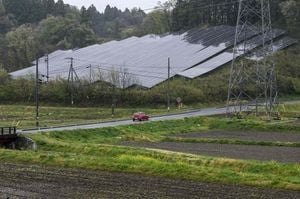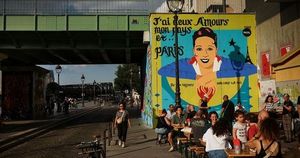Spain, Portugal, and parts of France experienced a massive blackout on April 28, 2025, leading to widespread panic and chaos as citizens rushed to supermarkets to stock up on essential supplies. The unexpected power outage left millions without electricity and internet access, igniting fears that the situation could last longer than anticipated.
In cities across Spain, long queues formed outside supermarkets reminiscent of the early days of the COVID-19 pandemic. Shoppers hurried to grab necessities, fearing that they might not have access to food and water for an extended period. "This is what happened yesterday in many supermarkets due to the blackout. It’s incredible that after the pandemic we haven’t learned anything, and they said that 'after this we will be better,'" remarked a user on social media.
Bottled water was the first item to vanish from shelves, quickly followed by toilet paper, milk, canned goods, and prepared meals. In major urban centers such as Madrid, Seville, and Barcelona, the situation escalated to the point where some supermarkets had to control customer access. Certain stores limited their capacity, and police intervention became necessary to prevent dangerous overcrowding.
Major supermarket chains including Mercadona, Carrefour, Alcampo, and El Corte Inglés managed to keep their operations running during the blackout thanks to backup generators. Mercadona expressed gratitude to its staff for their commitment during the crisis, stating, "Thanks to the effort of all our staff, today we opened our stores, ready to provide the best possible service. Thank you to all our customers for their cooperation." This dedication allowed many stores to remain operational even as the general electrical grid failed.
As the day progressed, images emerged from various locations, including a Mercadona in Poblenou, Barcelona, where the shelves were already stripped bare by 14:00, just two hours after the power outage began. "It seems like the world is going to end," a young woman could be heard saying in a video recording of the scene.
Across Barcelona, hundreds flocked to supermarkets, even those that were closed, leading to massive lines at checkout counters in those that remained open. The panic buying mirrored the chaotic scenes seen during the initial lockdowns of the pandemic when essential items were in high demand.
Fortunately, electricity began to be restored during the early hours of April 29, 2025, and by the morning, most of the country had regained power and internet connectivity. Supermarkets quickly began to restock their shelves, returning to normal operations. However, the visual remnants of the chaos from the blackout left a lasting impression on the Spanish public.
Despite the restoration of power, other infrastructure issues lingered. The railway network and roads faced complications; some traffic lights remained non-functional, causing delays and difficulties for commuters. Renfe and Adif, the railway operators, reported significant disruptions, particularly at Sants station in Barcelona, where thousands of passengers were forced to spend the night due to canceled trains and delays.
As the situation stabilizes, the events of the blackout serve as a stark reminder of the fragility of modern infrastructure and the need for preparedness in the face of unforeseen emergencies. The rapid response of supermarket chains and the dedication of employees played a crucial role in managing the crisis, but the fear and chaos experienced by the public highlight the psychological impact of such events.
In the aftermath, discussions are likely to arise about the lessons learned from this incident and how communities can better prepare for similar occurrences in the future. The images of empty shelves and frantic shoppers will remain etched in the collective memory of Spain, serving as a cautionary tale about the importance of resilience in times of crisis.
As the country moves forward, the hope is that the experience will foster a greater sense of community and preparedness, ensuring that when the next challenge arises, citizens will respond with a calm and collected approach rather than panic.




